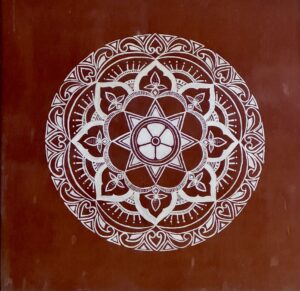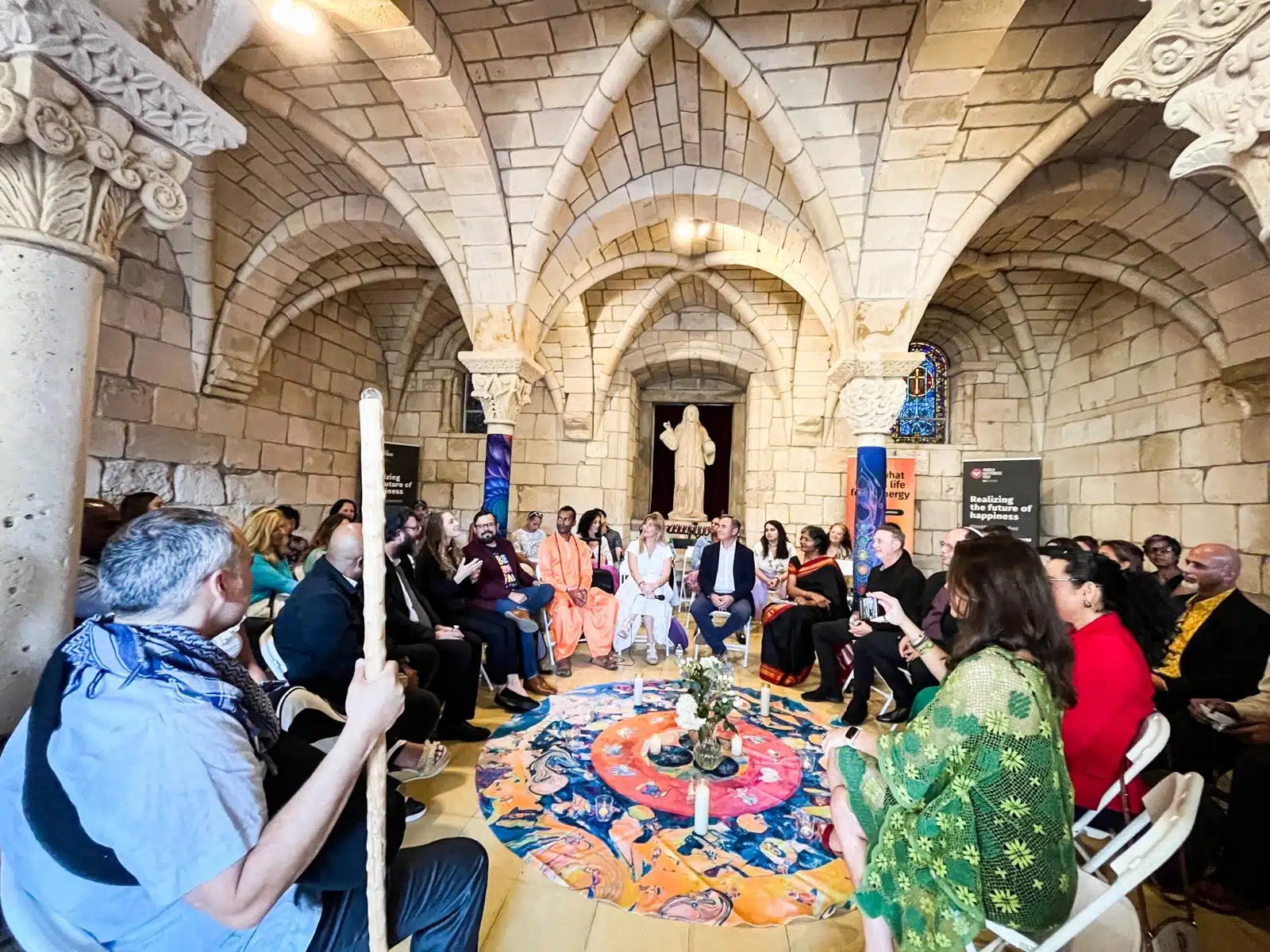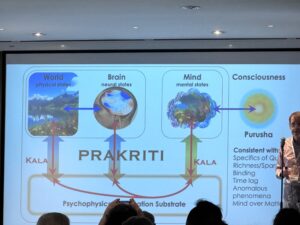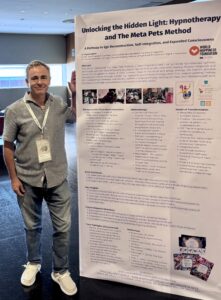
Do Psychopaths Have a Soul? Why the World Seems to Be Run by Their Kind
The Soul Question in a Troubled World Have you ever

Pope Francis’s death at 88 marks the end of an era defined by compassion and service. As the first Latin American pope and a man of simple words and humble manner, Francis bridged divides and touched millions with his warmth. In reflecting on his passing, we are invited to consider a pressing question: How can the world’s religions carry forward his spirit to foster global happiness, fundamental peace, freedom, and a higher consciousness?
This op-ed looks at Pope Francis’s life of purpose and explores how faith traditions—old and new, East and West—might evolve to unite humanity in pursuit of joy and peace.
Pope Francis often said that a life lived for others is the highest calling. “The life of Jesus is a life for others. It is a life of service,” he once reminded the faithful, a creed he visibly lived out. From washing the feet of refugees to embracing society’s outcasts, Francis showed that true purpose is found in humility and kindness. He preached that genuine happiness doesn’t come from money or technology, but from love and faith.
“Happiness can’t be bought… Only the happiness of love lasts!” he wrote, stressing that joy is a gift of the Spirit meant to “leaven” society. In a world obsessed with quick pleasures, he warned that our “technological society has succeeded in multiplying occasions of pleasure, yet has found it very difficult to engender joy”. His message was clear: even amid life’s contradictions and trials, love gives life meaning.
As he said in a TED talk, “life, even in the middle of so many contradictions, is a gift, [and] love is the source and the meaning of life”. By recognizing this, Francis argued, we naturally feel compelled “to do good” for others. His entire papacy modeled this principle of joyful service, showing that when we lift up the vulnerable and tend to spiritual needs, we tap into a deep well of happiness and purpose.
Francis also pushed the Catholic Church to be more merciful and open. He famously described the Church not as an exclusive club of the saved, but as a “field hospital after battle”, treating the wounded and seeking those on the margins. This vision shifted focus from dogma to healing. “The church is a field hospital, to save the people, not just to cure some little problems,” he explained, emphasizing openness to the world.
Under his guidance, the Church reached out to refugees, the poor, and those who had fallen away, prioritizing mercy over judgment. In one defining moment early in his papacy, when asked about gay Catholics, Francis responded, “Who am I to judge?”. It was a simple phrase that signaled a more inclusive tone, resonating far beyond the Church.
This empathetic leadership earned Pope Francis a reputation as a “Pope of the People,” someone who met others with a smile and an embrace, seeing the face of God in the poor and forgotten. His passing leaves a challenge: for religious communities to carry on this legacy of joyous service and inclusivity in a troubled world.
In an era of global crises and secular skepticism, Pope Francis believed that religions must work together to heal a fractured world. He championed interfaith dialogue, even co-signing the landmark Document on Human Fraternity with the Grand Imam Ahmed el-Tayeb, which declared that “authentic teachings of religions invite us to remain rooted in the values of peace… mutual understanding, human fraternity and harmonious coexistence”.
In other words, at their core, all faiths call for peace, compassion, and unity. This message feels revolutionary in a time when religious differences are too often exploited to sow division. Francis reminded us that faith can never be used to justify hate or violence. Instead, true faith “reawakens religious awareness” in young people towards justice and love, steering them away from materialism and “unbridled greed”.
As we reflect on Francis’s death, there is an urgency for religions to evolve and stay relevant by embracing this core spiritual essence. That means moving beyond rigid dogmas and power struggles that have at times stained religious history. It means focusing on the shared values that all great faiths uphold: love of neighbor, care for creation, the pursuit of inner peace, and service to others. Pope Francis showed this evolution in action—whether admonishing world leaders to end the “globalization of indifference” toward migrants or urging his own bishops to combat the “culture of death” behind abuse and corruption.
He opened archives and sought truth and reconciliation, demonstrating that transparency and justice are also spiritual values. To remain a force for good, religions in the modern world must similarly confront their own failings and renew their commitment to humanity. They must ask, as Francis did, how they can “support all persons, especially the poorest and those most in need”. By doing so, faith traditions become not relics of the past, but vital partners in building a happier, more peaceful future.
One way religions can revitalize their role is by rekindling their mystical and contemplative traditions – the timeless practices that open paths to inner peace and universal love. Every major faith has a wellspring of mysticism at its heart, often overshadowed by external rites or politics. These mystical paths focus on personal transformation and direct encounter with the sacred. They remind us that beyond doctrines, at the very core of spirituality, lies an experience of unity and love that can bind all of humanity together.
In Christianity, for example, the mystical tradition dating back to saints and hermits seeks an intimate union with God. Christian mystics speak of a “desire for love-union with a personal God,” a longing of the heart that transcends mere ritual. From St. Francis of Assisi to St. John of the Cross, they teach that by emptying oneself of ego and filling oneself with divine love, a person can reflect Christ’s light in the world. This inner journey complements the outer works of charity that Francis exemplified. It shows a path to joy that doesn’t depend on material conditions—a joy, as Pope Francis said, that “spreads to everyone around us”.
Similarly, Islam’s mystical dimension, Sufism, offers profound wisdom for our times. “Sufism is a mystical path of love in which God… is experienced as the Beloved,” wrote one Sufi master, and the seeker becomes a “lover of God”. Sufis—whether whirling in dance or whispering prayers—aim to dissolve the selfish self and live in constant awareness of the Divine. Their poetry and music celebrate an all-embracing love. It’s said that the 13th-century Sufi poet Rumi’s verses can make even strangers feel like friends, because they speak to that spark of truth and love in every soul. In a world marred by hate, the Sufi message that divine love is everywhere is a balm and a guide toward peace.
Judaism too has its esoteric heart in Kabbalah, long guarded by sages and seekers. Kabbalistic teachings see the Torah not just as law or history, but as a living map of the soul’s journey to God. Kabbalah unveils a vision of a cosmos held together by the “secret of divine unity” – a unity revealed through love and righteous living. It forms “the foundation of mystical religious interpretations within Judaism,” showing how every letter of scripture, every element of creation, is interconnected.
To the Kabbalist, to love one’s neighbor is to love God, since all souls are ultimately one. In modern times, Kabbalah’s popularity beyond Jewish communities (sometimes in diluted form) hints at a hunger for spirituality that goes beyond labels. It’s a reminder that within organized religion lies a deep well of wisdom about finding oneness amidst diversity.
Hinduism offers yet another rich tapestry of mysticism through practices like yoga and philosophies like Vedanta. Ancient Hindu sages taught that our deepest Self (Atman) is identical with the ultimate reality (Brahman) – “the single binding unity behind the diversity in all that exists”. This non-dual perspective, especially in Advaita Vedanta, holds that if we look within through meditation and self-inquiry, we realize that the divine is not a distant deity but the very essence of our being.
The Upanishads describe this state as Sat-Chit-Ananda, or “being-consciousness-bliss,” the natural state of the Self when freed from illusion. In practical terms, millions of people who practice yoga or mindfulness today—whether Hindu or not—are tapping into this ancient quest for inner peace and liberation. The Hindu tradition, with its pantheon of symbols and myriad techniques (from chanting to breathwork), essentially gives many pathways toward the same goal: uniting the individual soul with the universal, achieving moksha, the release from suffering into blissful freedom.
Buddhism, though non-theistic, is profoundly spiritual in its focus on ending suffering through inner transformation. The Buddha taught meditation as a systematic way to understand and calm the mind, leading to nirvana – often defined as the extinguishing of the fires of greed, hate, and delusion. In Buddhism, ultimate happiness comes not from any external condition, but from awakening to the true nature of reality. Nirvana “represents the cessation of suffering and the realization of profound inner peace and contentment,” as one description puts it.
In classical terms, nirvana is the end of dukkha (suffering) and the cycle of rebirth, a liberation into unshakeable peace. The practices of mindfulness and loving-kindness (metta) meditation that have spread worldwide are gifts from Buddhism’s contemplative heritage. Scientific studies now show these practices can literally rewire the brain for greater empathy and less anxiety, confirming what Buddhist monks have long said: compassion and serenity are skills we can all cultivate. In an age of anxiety, Buddhism’s emphasis on inner peace offers a secular-friendly template for how spirituality can directly improve daily well-being and interpersonal harmony.
Even Indigenous traditions, often overlooked in global discussions on religion, carry crucial wisdom about living in balance. Many Indigenous peoples approach spirituality not as a separate part of life but as a way of life—one that treats all creation as kin. The Indigenous worldview has been called a “kinship worldview” in which “the world [is] sacred, unified, and moral… a connected partnership… about collaboration and unification across human groups, animal species, plant species, waterways, mountains, everything that’s alive”.
Long before modern ecology, Indigenous spirituality taught that humans are not masters of the earth but members of a wider community of life, with responsibilities to care for the land and each other. Pope Francis himself seemed to recognize this truth when he donned a Native American headdress during a 2022 visit with First Nations elders in Canada, an act of respect for their culture and spiritual heritage.
Pope Francis wears a traditional Indigenous headdress during a 2022 meeting with First Nations communities in Canada – a moment symbolizing respect and the bridging of spiritual worlds. Indigenous teachings, whether encapsulated in the phrase “Mitákuye Oyás’iŋ” (“all my relations”) among the Lakota, or in the Andean concept of Sumak Kawsay (“good living” in harmony), echo the same mystical insight: we are all connected. By honoring the sacred in nature and in each other, we foster a profound sense of peace and happiness. As modern society grapples with environmental crises and social alienation, these ancient teachings offer a roadmap back to balance and contentment.
Across Christianity, Islam, Judaism, Hinduism, Buddhism, and Indigenous paths, the message reverberates: the ultimate purpose of spiritual life is to awaken love, peace, and unity. This is the golden thread that Pope Francis highlighted through both words and deeds. In our increasingly interconnected world, religions have a choice. They can cling to rigid dogmas and institutional power struggles and watch their relevance wane – or they can embrace the mystical, compassionate core that makes them a wellspring of hope. By choosing the latter, faith traditions become powerful allies in addressing global challenges. They can inspire believers to work for justice, to heal the planet, to uplift the downtrodden, and to overcome the fears that divide us.
Imagine a world where religious leaders come together not to argue theology, but to jointly combat hunger, violence, and despair. This was very much Pope Francis’s vision. He insisted that faith must translate into action, that praying for the poor is empty unless we also feed and comfort them. He urged all people of faith to see each other as brothers and sisters.
“Faith leads a believer to see in the other a brother or sister to be supported and loved,” he wrote in the Human Fraternity document. Such a stance doesn’t erase theological differences, but it places human solidarity above them. It recognizes, as Francis did, that at the heart of every person—Christian, Muslim, Jewish, Hindu, Buddhist, or otherwise—there is a yearning for happiness and peace that is our common birthright as children of the Divine.
For religion to become a force for global happiness, it must foreground this spiritual essence over divisive dogma. That means encouraging the contemplative practices and ethical teachings that cultivate empathy and understanding, while shedding the prejudices and rigid rules that fuel conflicts. It means leaders who, like Francis, apologize for past errors and seek forgiveness and reconciliation.
It also means engaging with the modern quest for meaning, reaching out to those with no religious affiliation but who still seek purpose and community. In a time of rampant consumerism and loneliness, the world is quietly crying out for what authentic spirituality offers: connection, purpose, transcendence. Religions stay relevant by meeting that cry with openness and creativity, much as Francis did by taking the Church out of its comfort zone and into the streets, the refugee camps, and the public squares.
As we bid farewell to Pope Francis, we do so with both sorrow and hope. Sorrow, because we have lost a guiding moral voice who reminded us that leadership can be gentle and joyful. Hope, because his legacy lights a path forward. He showed that a life of service is a life of happiness, and that when religions serve humanity’s deepest needs, they illuminate the way to a more peaceful world. In one of his reflections, Pope Francis wrote that “joy is the salt of the earth and the light of the world”. In the dark and bitter corners of our global community, joy has indeed been in short supply. But the recipe to restore it is age-old and simple: love one another, as all our faiths instruct.
The passing of Francis is a moment of reflection for Catholics and non-Catholics alike. It invites us to look beyond the man to the values he embodied. In a world yearning for happiness, fundamental peace, freedom, and a higher consciousness, religions can and must be part of the solution. The mystics and sages have long shown the way—turn inward to find the divine spark, then turn outward to share its warmth through compassion.
Pope Francis, in his own modern and very human way, lived that wisdom on the world stage. If we carry that forward—if we let love, not dogma, be our guide—then the world’s religions truly can join hands to become, together, a field hospital for humanity, healing the wounds of division and tending the soul of the world. In that mission, we find not only global fraternity, but the true happiness that comes from a life of purpose and peace.
Sources: Pope Francis, Happiness in This Life; Pope Francis, TED Talk (2017); Evangelii Gaudium; Spadaro interview (2013); Document on Human Fraternity; Trappist reflections on mysticism; Sufi teachings; Kabbalah overview; Upanishads/Vedanta; Buddhist teachings; Indigenous worldview insights.
With all my light, Luis Miguel Gallardo Founder, World Happiness Foundation & Academy Author of Unlocking the Hidden Light, Happytalism, Brands & Rousers, and The Exponentials of Happiness
#PopeFrancis #RestInPeace #WorldHappiness #InterfaithHarmony #ReligiousUnity #MysticalTraditions #SpiritualAwakening #HumanFraternity #FaithAndLove #PeaceAndCompassion #FreedomAndConsciousness #LegacyOfFrancis #MysticismMatters #SufiWisdom #ChristianMysticism #KabbalahWisdom #VedantaTruth #BuddhistPeace #IndigenousWisdom #LoveOverDogma #ReligionsForPeace #GlobalSpirituality #PurposeDrivenLife #HappinessThroughFaith #UnityInDiversity #SacredWisdom #ContemplativePractice #EvolveReligion #FieldHospitalChurch #FaithForHumanity
Join the Alchemy of Leadership Program: https://www.worldhappinessacademy.org/offers/ezL8GGWJ
Join our community of Global Well-Being and Impact Leaders:
Apply here: Global Well-Being and Impact Leadership Certification – Application Page
Join us in this bold journey. Let’s champion a new paradigm of leadership together – one where happiness, well-being, and impact are at the heart of every strategy and every action.
Become a part of GWILC and help realize the vision of a world where everyone, everywhere can thrive in freedom, consciousness, and happiness. The next seven years of global leadership evolution start now – and we invite you to lead the way.
#LeadWithWellBeing #GWILC #Happytalism #GlobalLeadership #WorldHappiness
Jaipur Rugs Jaipur Rugs Foundation Upasana Design Studio World Happiness Fest – bēCREATION World Happiness Academy University for Peace (UPEACE) – UN Mandated UPEACE Centre for Executive Education Saamdu Chetri Manas Kumar Mandal
Dr. Rekhi Singh REKHI FOUNDATION FOR HAPPINESS Adamas University Shoolini University Saamdu Chetri Vibha Tara Manas Kumar Mandal Prof. (Dr.) Shauli Mukherjee
Visit www.worldhappinessfest.com and become part of the journey. Together, we regenerate. Together, we create magic.
What’s your perspective?
Join us today and become a conscious catalyst for well-being. Together, we can create a world where happiness leads the way.
Join this global movement and elevate your organization!
REGISTRATIONS OPEN
Access the link for English: https://lnkd.in/d8cinrFU
Spanish: https://lnkd.in/dtwuRaTT
Portuguese: https://lnkd.in/dFRNYBQZ
#Psychobiology #Hypnotherapy #MindBodyConnection #Neuroscience #SubconsciousMind #HealingThroughHypnosis #MentalHealthAwareness #Epigenetics #BruceLipton #CandacePert #EllenLanger #MindfulBody #MatthewBrownstein #InterpersonalHypnotherapy #DavidSpiegel #PlaceboEffect #MindOverMatter #Neuroplasticity #HolisticHealing #StressReduction #CognitiveBehavioralTherapy #PsychosomaticHealing #HealingTrauma #EmotionalWellbeing #ChronicPainRelief #AnxietyManagement #MeditationAndHypnosis #SelfTransformation #UnlockingTheHiddenLight #ResilienceAndHealing
#Exposome #Happytalism #HumanFlourishing #10BillionHappy #GlobalWellBeing #EnvironmentalHealth #EthicalLeadership #SystemsThinking #RegenerativeWellBeing #PublicHealth #PrecisionPrevention #GlobalGovernance #EnvironmentalJustice #MoonshotMindset #HolisticHealth #HumanExposomeProject #MentalHealthMatters #PlanetaryHealth #ScienceForWellbeing #CompassionateLeadership #PurposeDrivenGovernance #DataForGood #WellBeingEconomy #HappinessMovement #SocialDeterminantsOfHealth #AIForGood #HealthEquity #SustainableDevelopment #WorldHappinessFoundation #LuisGallardo
….join the Cities of Happiness Initiative: https://www.teohlab.com/city-of-happiness
Unlocking the Hidden Light book: https://a.co/d/gaYuQJ6
Join the pull of Mental Health Professionals ready to help addressing trauma and nurturing collective well-being: https://forms.gle/39bGqU177yWcyhSUA
Join the community of catalysts of positive transformation: https://www.worldhappiness.academy/bundles/certified-chief-well-being-officer-professional-coach
Enjoy a free 30-minute coaching session with me. Book it here: https://www.worldhappiness.academy/courses/coaching-and-hypnotherapy-with-luis-gallardo
Link to Meta Pets Coloring Book
For more information and to join the movement, visit World Happiness Foundation.
#WorldHappinessFest #Happytalism #GlobalHappiness #WellBeing #Sustainability #ConsciousLiving #WorldHappinessFoundation #FreedomAndHappiness #GlobalWellBeing
Go Deeper into Happytalism.
Read the Book Brands & Rousers. The Holistic System to Foster High-Performing Businesses, Brands and Careers.
Explore how to make your Organization an #EnterpriseofHappiness.
Chief Well-Being Officer Program. https://www.worldhappiness.academy/courses/Chief-Mental-and-Physical-Wellbeing-Officer
Certified Professional Coach. Specialized in Happiness & Well-Being: https://www.worldhappiness.academy/courses/Professional-Coaching-Specialization-in-Happiness-and-Well-Being
Explore how to make your schools a #SchoolofHappiness.
https://worldhappinessacademy2.com/Schoolsofhappinesshome
Explore how to make your city a #CityofHappiness. https://www.teohlab.com/city-of-happiness
Gross Global Happiness Summit. https://centre.upeace.org/ggh-2025/
World Happiness Fest. https://worldhappiness.foundation/fest/world-happiness-week/
Apply for a Scholarship to the Chief Well-Being Officer Program. https://forms.gle/6PfnFAUQJ39RC4Rv7
#Happytalism #Happytalismo #Happiness #WorldHappiness #WorldHappinessFest #WorldHappinessAcademy #WorldHappinessPress #CWO #ChiefWellBeingOfficer #CoachingforHappiness #GNH #GGH #Leadership #Education #MentalHealth #Health #Hope #Forgiveness #Compassion #Love #Kindness #Consciousness #Freedom #Jaipur #India
UPEACE Centre for Executive Education University for Peace (UPEACE) – UN Mandated Florida International University Florida International University – College of Business Dr. Rekhi Singh REKHI FOUNDATION FOR HAPPINESS Indian Institute of Technology, Kharagpur Saamdu Chetri Dr. Sungu Armagan Dr. Edith Shiro Vibha Tara Ellen Campos Sousa, Ph.D. Jayati Sinha Valerie Freilich Mavis Tsai Mohit Mukherjee Rosalinda Ballesteros Raj Raghunathan Philip Kotler Nichol Bradford Daniel Almagor Raúl Varela Barros World Happiness Fest – bēCREATION Fundación Mundial de la Felicidad (España) Luis Gallardo Aneel Chima Manas Kumar Mandal Jennifer Price Paul Atkins Yogesh Kochhar Loretta Breuning, PhD Tia Kansara Ph.D. Hon FRIBA Deepak Ohri Nancy Richmond Rolando Gadala-Maria Carine Bouery Liliana Nuñez Ugalde LANU Silvia Parra R
#DeepReflection #ConnectionToLife #EmotionalHealing #CompassionateInquiry #GratitudeJourney #TouchVsFeel #TraumaHealing #IntegratingShadows #EmpoweringGifts #SubconsciousHealing #ManifestationPower #Wholeness #HealingTrauma #InnerJourney #EmbracingVulnerability #HumanConnection #PathToFlourishing #NewHumanity #CompassionateLiving #SelfAwareness #SelfEmpowerment #HealingThroughGratitude #TransformingSuffering #ShadowWork #EmotionalIntegration #LightAndShadow #HealingJourney #FeelingAlive #TruthAndHealing #WholenessAndHealing #ConsciousLiving #SpiritualGrowth #MindfulLiving #HealingThroughCompassion #SelfDiscovery #InnerPeace #LivingFully #EmbraceTheJourney #FindingGratitude #HealingThroughHypnotherapy #HumanFlourishing

The Soul Question in a Troubled World Have you ever

As Barcelona pulses this week with the presence of leading

What does it feel like to be alive? This is
